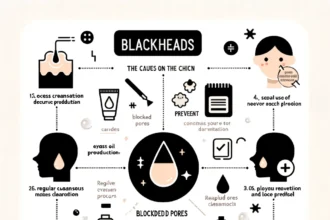This comprehensive guide cuts through the marketing jargon to focus on twelve dermatologist-recommended ingredients that are truly transformative for your skin. Let’s explore these powerhouses, why they work, and how to incorporate them into your routine.
The Truth Behind the Hype: Understanding Skincare Ingredients
Before diving into the specific ingredients, it’s crucial to understand why simplicity and science should guide your skincare choices. The skincare industry often relies on attractive terminology to sell products, but these buzzwords seldom reflect the product’s efficacy. Learning about the active ingredients and their benefits can help you make informed decisions, ensuring that you’re not just buying into a trend but investing in your skin’s health.
Twelve Essential Skincare Ingredients Dermatologists Trust
- Hyaluronic Acid:
- What it does: This moisture-binding ingredient helps hydrate and plump the skin by retaining water up to 1000 times its weight in moisture.
- Ideal for: All skin types, especially dry and aging skin.
- Real-life application: Look for serums that contain hyaluronic acid to use under your moisturizer to lock in hydration.
- Retinol (Vitamin A):
- What it does: Accelerates cell turnover, aids in anti-aging, and helps with acne.
- Ideal for: Aging skin and acne-prone skin types.
- Real-life application: Start with a low concentration and use it in your nighttime routine to minimize sensitivity from sun exposure.
- Vitamin C:
- What it does: A potent antioxidant that can neutralize free radicals and aid in your skin’s natural regeneration process, effectively helping your body repair damaged skin cells.
- Ideal for: All skin types as it brightens the skin, helps reduce pigmentation and fine lines.
- Real-life application: Incorporate a vitamin C serum into your morning routine before sunscreen for enhanced protection against environmental damage.
- Niacinamide:
- What it does: Strengthens the skin’s barrier, reduces inflammation, and can help with redness and hyperpigmentation.
- Ideal for: Especially beneficial for acne-prone and oily skin types.
- Real-life application: Use products with niacinamide before moisturizing, ideally twice daily for best results.
- Salicylic Acid:
- What it does: A beta-hydroxy acid that works as a chemical exfoliant to unclog pores and reduce acne.
- Ideal for: Oily and acne-prone skin.
- Real-life application: Find a cleanser or toner that contains salicylic acid for daily use.
- Zinc Oxide:
- What it does: Acts as a physical sunscreen, providing broad-spectrum protection against UVA and UVB rays.
- Ideal for: All skin types, particularly sensitive or acne-prone skin.
- Real-life application: Use a sunscreen containing zinc oxide as the active ingredient for effective sun protection.
- Ceramides:
- What it does: Lipids that help form the skin’s barrier and help skin retain moisture.
- Ideal for: Dry, irritated, or sensitive skin.
- Real-life application: Look for moisturizers that list ceramides as one of the top five ingredients.
- Alpha Hydroxy Acids (AHAs):
- What it does: Water-soluble acids made from sugary fruits that help peel away the surface of your skin so that new, more evenly pigmented skin cells may generate and take their place.
- Ideal for: Aging skin and those with uneven skin tone.
- Real-life application: Use an AHA cream or serum a few times a week as part of your nighttime routine.
- Tea Tree Oil:
- What it does: Known for its anti-inflammatory and antimicrobial properties, it’s a great option for treating acne and calming skin irritation.
- Ideal for: Acne-prone skin.
- Real-life application: Dilute tea tree oil with a carrier oil and apply it directly to blemishes as a spot treatment.
- Peptides:
- What it does: Chains of amino acids that signal your skin to produce more collagen, leading to firmer, younger-looking skin.
- Ideal for: Aging skin.
- Real-life application: Peptide-enriched serums can be used both morning and night under moisturizer.
- Squalane:
- What it does: A highly-effective emollient and natural antioxidant that can help fortify the skin barrier and improve skin hydration and flexibility.
- Ideal for: Dry or aging skin.
- Real-life application: Opt for a lightweight squalane oil to use as your final moisturizing step.
- Benzoyl Peroxide:
- What it does: Kills bacteria underneath the skin, helping to treat and prevent acne.
- Ideal for: Acne-prone skin.
- Real-life application: Available in various forms, such as cleansers, creams, and spot treatments. Use sparingly to avoid skin irritation.
Implementing These Ingredients into Your Skincare Routine
When incorporating new ingredients into your skincare regimen, it’s essential to:
- Patch test new products to ensure you don’t have a reaction.
- Introduce one product at a time to determine how your skin reacts to each ingredient.
- Consult with a dermatologist to tailor a skincare routine that meets your specific needs.
Conclusion
Understanding and selecting skincare products based on effective ingredients rather than appealing marketing ensures that your skincare investments are sound. By focusing on these dermatologist-recommended ingredients, you can create a skincare routine that truly benefits your skin’s health over the long term.
Remember, skincare is deeply personal. What works for one person might not work for another, so it’s crucial to listen to your skin and adjust as needed. Always consult with a skincare professional to maximize your results.








Your point of view caught my eye and was very interesting. Thanks. I have a question for you.